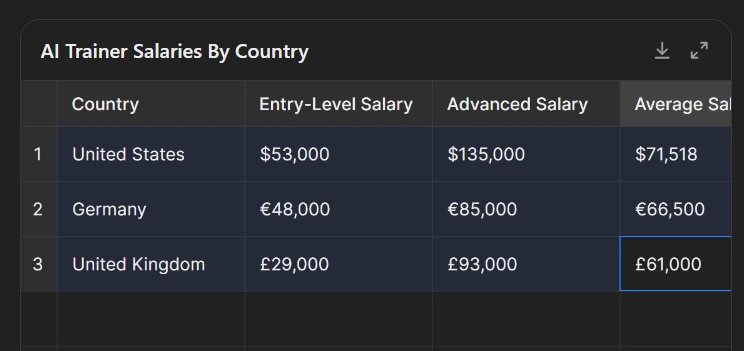An AI Trainer is essential in developing smart systems. These professionals curate and prepare data, ensuring it’s clean, unbiased, and relevant.
They also configure conditions and responses for AI, making the models robust and efficient across various applications, from speech recognition to autonomous driving.
AI trainers also play a key role in simplifying complex concepts for their teams. They work with data scientists and machine learning engineers to feed curated data into models.
Their expertise in data science and machine learning optimizes AI systems through continuous training and algorithm adjustment.
Exploring the role of an AI trainer

AI Trainers play a crucial part in artificial intelligence. They handle the training, refining, and improvement of AI systems to ensure they perform well in various applications.
Job description and core responsibilities
An AI Trainer works with large datasets to develop and refine AI algorithms. Their main tasks include preparing data, designing training scenarios, and optimizing machine learning models.
They also need to ensure that AI systems understand and respond correctly to user inputs.
One key responsibility is annotating data. This involves labeling datasets to help the AI recognize patterns and make accurate predictions. They also create and adjust algorithms to improve AI performance. Regular testing and error analysis are essential to identify and fix problems.
Another vital duty is collaboration. AI trainers often work closely with data scientists and software developers. This teamwork helps integrate AI systems effectively into larger projects. Good communication and problem-solving skills are crucial for success.
Key roles in AI training projects
AI Trainers have several roles within training projects. Firstly, they act as data curators, collecting and organizing data needed for training. This ensures models have high-quality information to learn from.
They also serve as algorithm developers. They write and tweak code to create models that can learn from data. This involves using machine learning frameworks like TensorFlow or PyTorch.
Another key role is quality assurance. AI trainers test models to ensure they function correctly. They run simulations and real-world tests to check performance and accuracy. This helps catch and fix errors before deployment.
Lastly, they act as user advocates. AI Trainers ensure that AI systems meet user needs and provide a positive experience. They gather feedback and make necessary adjustments to improve the system’s usability and effectiveness.
Requirements and skills for AI trainers

AI trainers play a vital role in teaching and refining artificial intelligence systems. These professionals need a blend of educational qualifications, technical expertise, and soft skills to excel in their field.
Educational background
An AI trainer typically has a degree in a related field such as computer science, data science, or artificial intelligence.
Some positions may require a master’s degree or even a Ph.D., especially those involving advanced research or algorithm development.
Professional certifications in AI or machine learning can enhance career prospects. These can include certifications from well-known institutions like Google, IBM, or Coursera.
Staying up-to-date through continuous learning and attending workshops or seminars is also crucial.
Essential technical skills
AI trainers must have strong technical skills. Expertise in programming languages like Python is essential as it is extensively used in AI development.
Familiarity with machine learning frameworks like TensorFlow or PyTorch is equally important.
They should also have experience working with large datasets. These datasets are used to train models, so understanding data preprocessing, annotation, and augmentation techniques is vital.
Knowledge in algorithm design and optimization helps in fine-tuning AI systems for better performance.
Interpersonal and cognitive skills
Besides technical know-how, AI trainers must possess strong interpersonal skills.
Effective communication is crucial when explaining complex concepts to team members or clients.
Problem-solving skills are necessary to address any issues that arise during the training process.
Attention to detail is another key skill, as small errors can significantly impact AI model performance.
Ability to work collaboratively within a team and adapt to rapidly changing technologies also contributes to successful AI training.
The career path of AI trainers

AI trainers have a structured yet dynamic career path that allows for substantial growth and learning. They start with entry-level positions, gradually move to more advanced roles, and continually enhance their skills through certifications and ongoing education.
Entry-level positions
Starting as an AI trainer typically requires a strong foundation in computer science or a related field.
Entry-level roles often focus on tasks such as data curation and preprocessing. They ensure data used for training AI models is clean, unbiased, and relevant.
New AI trainers might perform activities like setting up simulation exercises or fine-tuning initial algorithms.
They work under the guidance of more experienced AI professionals, gaining hands-on experience vital for career advancement.
In addition, entry-level trainers need to have strong analytical skills. They should also be proficient in basic programming languages like Python.
Over time, they acquire a solid understanding of how AI systems respond to various inputs.
Career progression opportunities
As AI trainers gain experience, more opportunities become available. With time and proven performance, they can advance to senior roles.
These roles often involve leading teams, managing larger projects, and making strategic decisions.
Experienced AI trainers are responsible for creating complex datasets and optimizing training processes. They may specialize in certain types of AI, such as natural language processing or computer vision.
Job titles at this level might include AI Specialist, Senior AI Trainer, or AI Training Manager.
The salary range for seasoned AI trainers is quite attractive. Expert-level positions can earn between $100,000 and $200,000 per year, with top consultants potentially earning even more.
Continual learning and certifications
AI is a fast-evolving field, making continual learning essential.
AI trainers must stay updated with the latest advancements and methodologies. This often involves pursuing additional certifications and courses.
Certifications from recognized organizations can greatly enhance an AI trainer’s credibility and marketability.
Popular certifications include those from institutions like IEEE or specialized AI courses offered by universities through platforms like Coursera or edX.
Attending industry conferences, participating in workshops, and being part of professional networks are crucial moves.
These activities help AI trainers stay at the forefront of the field while continuously refining their skills and expanding their knowledge.
Salary trends and job market outlook
The role of an AI Trainer is becoming increasingly valuable and lucrative.
Salaries vary by region and experience, and professionals in this field are expected to see growing demand and attractive compensation packages.
Comparative salaries and benefits
AI Trainer salaries differ significantly by country and experience level.
In the United States, the pay ranges from $53,000 for entry-level positions to $135,000 for advanced roles. On average, AI trainers make about $71,518 per year, with additional compensation possibly raising this figure to $94,133 annually.
In Germany, AI trainers receive between €48,000 to €85,000 yearly. In the UK, the range is from £29,000 to £93,000 per year.

These salaries reflect the specialized skills and constant demand for AI expertise. Benefits often include health coverage, retirement plans, and sometimes bonuses based on performance and company growth.
Industry demand and future prospects
The job market for AI Trainers is expanding rapidly. AI’s role in digital transformation drives this growth across various sectors.
The number of jobs for AI-related positions is expected to grow by 23% between 2022 and 2032 according to the US Bureau of Labor Statistics. This is significantly higher than the average job growth rate.
Industry analyses suggest that the global AI market is projected to grow at a compound annual growth rate (CAGR) of 37.3% from 2023 to 2030.
This growth will likely result in higher demand for AI Trainers, improved salaries, and more job opportunities in diverse sectors, including healthcare, finance, and tech companies. Professionals with strong AI skills will find promising career prospects in this dynamic field.
AI Trainer FAQs

AI Trainers are important for the development and improvement of AI systems. They create training processes, craft datasets, and ensure that AI responds accurately to human input.
Below are some common questions about this profession.
What qualifications are needed to become an AI Trainer?
To become an AI Trainer, one typically needs a degree in computer science, data science, or a related field. Relevant experience in machine learning and data analysis is also beneficial.
Strong communication skills are important as trainers need to explain complex concepts to non-technical team members.
What does a day in the life of an AI Trainer entail?
An AI Trainer spends their day working on training datasets, running simulations, and evaluating AI model performance.
They also work closely with other team members to refine algorithms and ensure the AI can understand and process real-world data effectively.
Regular meetings and collaboration sessions are common.
What are the career prospects for AI Trainers?
AI Trainers have promising career prospects. With the rapid growth in AI applications, there is a high demand for skilled professionals in this field.
Many AI Trainers advance to senior roles or specialize in specific areas of AI, opening up opportunities for increased responsibility and higher salaries.
How should one prepare for an AI Data Trainer interview?
Preparing for an AI Data Trainer interview involves brushing up on technical knowledge, such as machine learning algorithms and data preprocessing techniques.
Practice explaining complex concepts in simple terms and be ready to discuss previous projects. Demonstrating expertise in both soft and technical skills will be crucial.
Which certifications are beneficial for aspiring AI Trainers?
Certifications in machine learning and AI from recognized organizations can enhance an aspiring AI Trainer’s credentials.
Examples include certifications from Coursera, edX, and similar platforms.
Additionally, vendor-specific certifications, like those from Google Cloud or Microsoft Azure, can be valuable.
Can you describe the typical responsibilities of an AI Trainer in the workplace?
AI Trainers are responsible for creating and managing datasets. They also run training simulations and constantly refine AI models.
They ensure that the AI systems can understand and respond to human inputs accurately.
AI Trainers frequently collaborate with data scientists and software engineers to improve the overall performance of AI applications.
